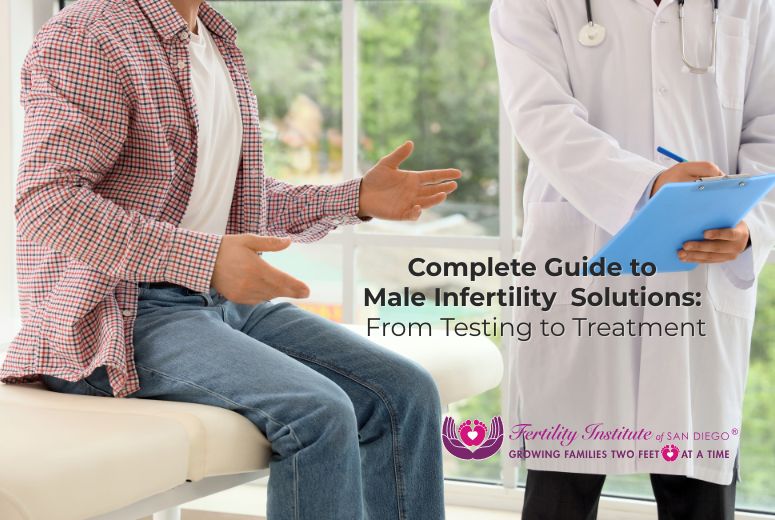Male infertility affects millions of men worldwide, yet it remains one of the least discussed aspects of reproductive health. At the Fertility Institute of San Diego, Dr. Minoos Hosseinzadeh provides personalized, evidence-based male infertility solutions to help patients achieve their dream of parenthood.
“I always remind patients that infertility isn’t just a women’s issue,” shares Dr. Hosseinzadeh. “In about half of all cases, a male factor plays a role — and the good news is, many of these cases are treatable.”
Understanding Male Infertility
Male infertility solutions focus on identifying and addressing the underlying causes that affect sperm production, function, or delivery. These issues can stem from hormonal imbalances, genetic factors, medical conditions, or lifestyle habits.
Common Causes of Male Infertility
- Low sperm count or motility
- Hormonal imbalances affecting testosterone or FSH/LH levels
- Varicocele (enlarged veins in the scrotum)
- Obstructions in the reproductive tract
- Exposure to toxins or radiation
- Genetic abnormalities
- Lifestyle factors such as smoking, marijuana, poor diet, or obesity
Why Testing Matters
The first step in male infertility treatment California couples rely on begins with precise testing. “We start with a comprehensive evaluation that includes semen analysis and hormonal testing,” explains Dr. Hosseinzadeh. “Understanding the cause allows us to design a targeted plan that truly works.”
Male Fertility Testing in San Diego
At our San Diego clinic, male fertility testing includes a detailed semen analysis to assess sperm count, motility, morphology, and volume. This is followed by a hormonal evaluation, which helps identify potential endocrine issues that might affect fertility.
Semen Analysis and Sperm Testing Explained
A semen analysis provides crucial insights into sperm health. This test examines factors such as sperm concentration, shape, and ability to swim. Abnormalities can indicate conditions like varicocele, infection, or hormonal dysfunction.
Hormonal Evaluation for Male Fertility
Hormonal testing measures key hormones such as testosterone, FSH, LH, TSH, and prolactin. Imbalances can disrupt sperm production and sexual function. Addressing these issues through medical management or hormone therapy can significantly improve fertility outcomes.
Causes of Male Infertility and How to Treat Them
Every case is unique, but common causes include anatomical issues, tubal blockages, genetic mutations, infections, or immune system issues. Fortunately, advanced male infertility solutions now make it possible to address most of these effectively.
Medical Treatments for Low Sperm Count
Depending on the diagnosis, treatments may include hormone therapy, varicocele repair, antibiotics for infections, or assisted reproductive technologies such as IVF with ICSI (intracytoplasmic sperm injection).
Lifestyle Changes to Improve Male Fertility
Dr. Hosseinzadeh often emphasizes the importance of lifestyle. “We encourage men to maintain a healthy weight, avoid smoking, marijuana, limit alcohol, and adopt a nutrient-rich diet,” she says. “Simple changes can have a profound effect on sperm health.”
Advanced Fertility Treatments for Men
When natural conception isn’t possible, advanced fertility treatments offer new hope.
IVF with ICSI
In cases of low sperm count or poor motility, ICSI, a technique where a single sperm is injected directly into an egg, can be highly effective. This approach bypasses natural barriers and improves fertilization rates.
Sperm Retrieval Procedures for IVF
For men with no sperm in their ejaculate, procedures such as PESA, TESA, or micro-TESE can retrieve viable sperm directly from the testicular tissue. These sperm can then be used in IVF or ICSI to achieve pregnancy.
Fertility Preservation for Men
Men undergoing cancer treatment or other medical therapies can benefit from sperm freezing before therapy begins. “Fertility preservation is an empowering step,” says Dr. Hosseinzadeh. “It allows men to take control of their future family planning.”
The Role of Nutrition and Hormone Balance
Nutrition and hormonal health play a critical role in male fertility. Foods rich in antioxidants, zinc, and omega-3 fatty acids can boost sperm quality. Similarly, addressing testosterone and thyroid imbalances helps optimize reproductive function.
Male Fertility Supplements and Nutrition
Supplements containing vitamin C, CoQ10, and folate support sperm health and reduce oxidative stress. However, supplements should be taken under medical supervision for safety and effectiveness.
Choosing the Best Fertility Clinic for Male Infertility in Southern California
FAQs
In many cases, yes. Treatment depends on the underlying cause and may include medication, surgery, or assisted reproductive techniques.
If you’re ready to start your fertility journey, please book a complimentary virtual consultation with Dr. Hosseinzadeh to discuss your options for male infertility treatment in California or any other reproductive healthcare questions.
















